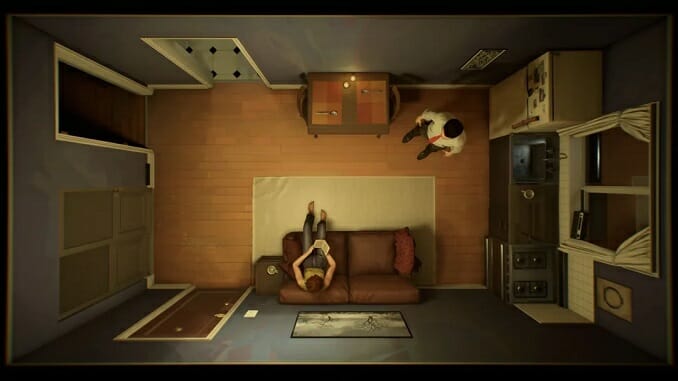Misguided Repetition Sinks The Tedious Twelve Minutes

There’s nothing wrong with repetition. In fact, it can be pretty amazing. Some of the best music ever made relies on it. (Hell, one of my favorite bands is The Fall.) It’s a powerful rhetorical device, works well in poetry and comedy, and can make an indelible impact when used in film or the visual arts. The videogame, in particular, depends on repetition, from repeating the same button sequences throughout a game’s core loop, to revisiting the same areas and levels again and again. I write a semi-regular column here about old-school shoot ‘em ups, one of the most repetitive game genres you’ll ever find. I’ve got no beef with repetition—at least when it’s done well.
Twelve Minutes is a perfect example of how not to do repetition in a videogame.
The much-buzzed about new point-and-click mystery game from designer Luis Antonio is a time loop whose loops don’t have enough time. By most accounts it takes about six hours to reach a conclusion, and you’ll replay the same few minutes dozens of times to reach that point. You’re stuck in the same three room apartment, having the same conversation with your wife and the mysterious cop impostor who breaks down your door to murder you, reliving the same brief slice of terror every few minutes. Why is this man threatening your wife? Why is he accusing her of murder? If you play it right, you’ll learn a little bit more every time through the loop. That progress is so minimal, though, and requires such deadening repetition of mundane actions that it never feels worth the investment. Too much of Twelve Minutes is repeating busy work in hopes of a breakthrough, which will inevitably just lead to more busy work before the next breakthrough.
Here’s what a standard loop is like in Twelve Minutes. Your character, who’s voiced by James McAvoy, gets home from work. His wife, played by Daisy Ridley, greets you. You’ll repeat a few basic actions (always by pointing and clicking—this is basically an ‘80s adventure game laser-focused on one bite-sized story) in order to get the scenario where you need it to be before Willem Defoe’s supposed cop invades your home; you’ll pick up a knife, grab some sleeping pills, drug your wife (yeah, you drug your wife a lot), all to open up a dialogue tree that, if played right, will give you a new step to add to the chain the next time your loop restarts. Once it does, you do all of this again, over and over. It’s stultifying.